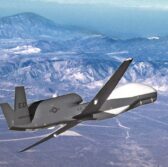 Raytheon and Lockheed Martin have received contracts from the Defense Advanced Research Projects Agency to perform system integration work for the second phase of the Collaborative Operations in Denied Environment program.
Raytheon and Lockheed Martin have received contracts from the Defense Advanced Research Projects Agency to perform system integration work for the second phase of the Collaborative Operations in Denied Environment program.
The CODE program aims to develop collaborative autonomy algorithms and open software architectures designed to help a single commander stimulate unmanned aircraft systems to perform both individual and group tasks in order to detect, track and engage maritime and ground targets in contested environments, DARPA said Friday.
Daniel H. Wagner Associates, Scientific Systems Co., Smart Information Flow Technologies, Soar Technology, SRI International and Vencore Labs secured contracts under the initial phase of the CODE initiative and will work with the two prime contractors to develop supporting platforms under the program’s Phase 2.
The six firms will help Lockheed and Raytheon deploy within each of the two open software architectures an initial subset of autonomous behaviors and subject up to two UAS to live flight tests using the two architectures, according to DARPA.
DARPA tested during the CODE program’s first phase a prototype of a human-system interface that works to allow a single individual visualize, command and control a group of drones.




